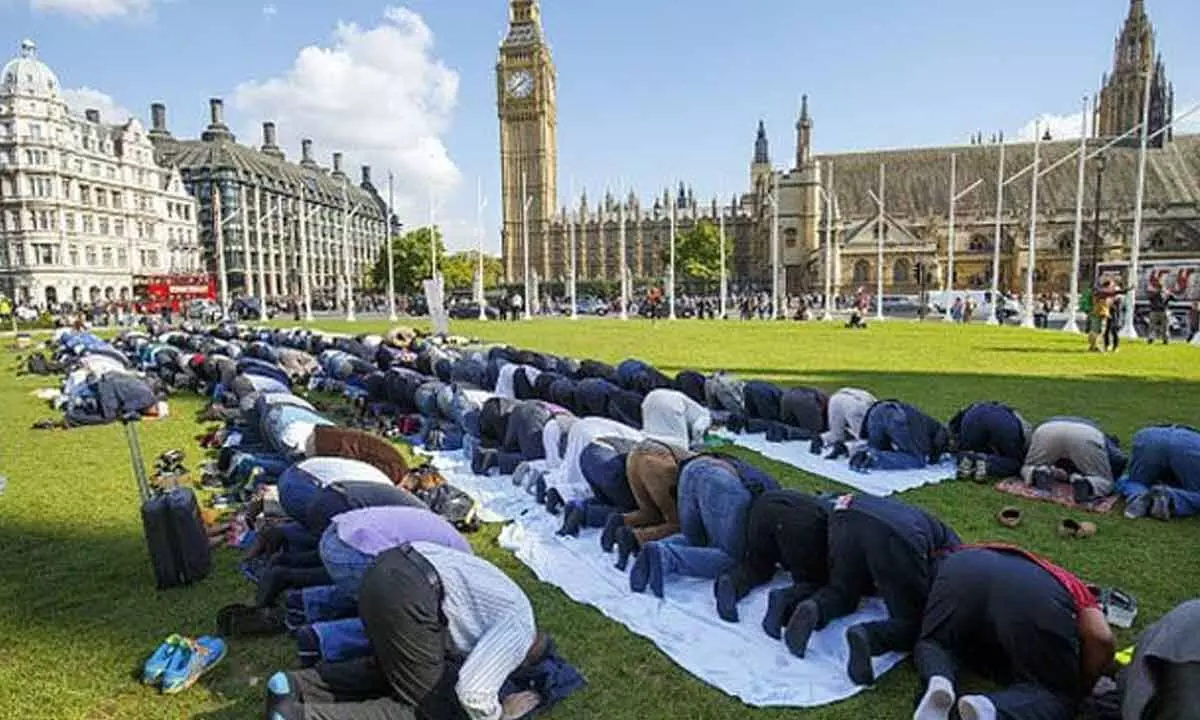British Muslims striding ahead

British Muslims striding ahead
Superficial concerns have been raised both within and outside the UK about the status of the Muslim population, though the census statistics convey something positive.
London: Superficial concerns have been raised both within and outside the UK about the status of the Muslim population, though the census statistics convey something positive.
UK's Office of National Statistics (ONS), last week released the latest Census data, which apparently shows that unemployment level amongst Muslims was as high as 1 in 20, for people aged between 16-64 years. As per the figures about 2.6 million Muslims live in areas where unemployment rates are high and which face housing shortage.
Figures from the ONS also revealed that Muslims in England and Wales reported the highest unemployment rates among religious groups, at 6.7 percent. Only 26 percent of Christians live in areas with the highest unemployment levels, but for Muslim communities the figure stood at 68 percent.
A quarter of Muslims live in socially rented housing – the highest for any religious group. As per figures, Muslims are more likely to live in overcrowded homes – their bedroom occupancy being the highest for any group, followed by Hindus and Sikhs. In contrast, those who identified themselves as having 'no religion', Christians and Jews live in the least crowded homes.
Jews and Hindus have the highest proportion of managers, directors or senior officials' and professional occupations', whereas Buddhists and Muslims have the highest percentages of people working in elementary occupations.
In response to the census findings in a press statement, the Muslim Council of Britain (MCB) has said that the inter-generational cycles of poverty impacting British Muslim communities can result in young people being forced to leave education in pursuit of work so they can help support their families.
Indeed, these are statistical figures and can be interpreted as per the desire of the reader. If we take a deeper analytical look, what exactly The Guardian has done, shows that the age trends amongst Muslims, as compared to other groups, may be a contributing factor to the statistics, with younger Muslims more likely to be studying than other youth in the general population. Also the unemployment rate is reported along with the areas having the highest unemployment rate, and since mostly Muslims inhabit these areas the unemployment rate is reported high, though the reality might be different.Further, the data has led to campaigners urging the government to focus on Muslim youth as part of its plan to "level up" Britain's economy. As more than two-thirds of Muslims live in local authorities that report the highest levels of unemployment.
Instead, once the figures were released publicly it would have given an opportunity to Muslim leaders and organisations to introspect about the status of Muslims in the UK and elsewhere, too. But as usual they tried to shift the blame to the government policies and access to facilities. This is happening with Muslims not just in the UK, but elsewhere too. Instead of becoming part of the mainstream and striving to access educational and job opportunities based on merit and competition, they want to be spoon fed by the governments.
If we take the case of the UK, then perhaps it is amongst the leading countries that provide a level playing field to its citizens. This is evident by the success of the Muslim community in any field whether be it business, finance or politics. We have a recent winner in Hamza Yousuf, the newly elected First Minister of Scotland and leader of the Scottish Nationalist Party. Similarly, we have London's Mayor Sadiq Khan, former Chancellor Sajid Javed, and former co-chair of the Conservative Party Saeeda Warsi.
A record number of Muslims were elected to the House of Commons in the UK's last parliamentary elections in 2017. Nineteen Muslim candidates, including 10 women won the elections. The mayors of London, Birmingham, Leeds, Blackburn, Sheffield, Oxford, Luton, Oldham, and Rochdale are Muslims.An estimated 443 Muslim councillors were elected in the local elections in held in 2022. Out of the 11 members in the House of Lords, there are 5 Baronesses and 6 Lords.
This leads one to surmise that instead of bemoaning about the facilities extended by the governments, Muslims should get better organised at the community level, focussing more on educational gains leading to better employment and financial opportunities, and as is evident from the numbers shown above, they could perform much better politically
if they turn out to be more educated but in addition we should try to ensure that once elected then they should work more towards community's progress in social, educational, financial and employment fields and contribute positively to its growth. (IANS)








